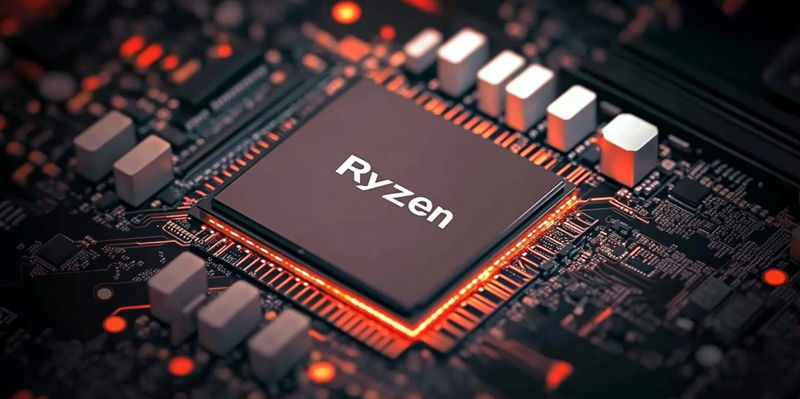In June, AMD introduced its Zen 5-based Ryzen AI 300 series mobile CPUs, targeting the client market. Recently, the company has released three new professional variants aimed at enterprise users under the Ryzen AI Pro 300 series banner. These Pro variants encompass three chips configured with either 12 cores and 24 threads or eight cores and 16 threads. They maintain key features similar to the client versions, including Zen 5 CPU cores, RDNA 3.5 GPU cores, and an XDNA 2 NPU delivering 50 TOPS of AI performance. Notably, two of the 12-core chips differ only in NPU performance, with one flagship SKU offering an additional 5 TOPS.
Significant NPU Capabilities Elevate Ryzen AI Pro CPUs
Enhanced Neural Processing Unit (NPU) Capabilities
The new Ryzen AI Pro CPUs represent a significant upgrade from AMD’s previous Pro CPUs based on Zen 4, especially in terms of NPU capabilities. The NPU performance has jumped from around 16 TOPS to an impressive 50 TOPS. Alongside this, the core count has increased from eight to 12, and the GPU compute units have been upgraded from 12 to 16. These enhancements mark a substantial leap in processing power, catering to the sophisticated demands of enterprise environments. Despite these upgrades, the CPUs maintain the same power consumption range of 15-54W, signaling a keen balance between performance and energy efficiency. Furthermore, AMD has hinted at improved battery life, boasting an "all-day" duration which could be a key selling point for mobile enterprise devices.
Improved Performance Metrics
One of AMD’s primary justifications for integrating a robust NPU into business machines is to enable on-device AI application processing. This capability is crucial as it enhances data privacy, a feature highly valued by enterprise users. AMD asserts that its Zen 5 Pro CPUs outperform Intel’s latest Meteor Lake-based vPro chips, claiming a 9-14% speed advantage in Microsoft Office tasks and a substantial 30-40% advantage in Cinebench benchmarks. This performance edge is particularly noteworthy as it pits AMD’s solutions directly against Intel’s, offering enterprises a compelling reason to consider the Ryzen AI Pro series for both performance and privacy needs.
Strategic Positioning in Competitive CPU Market
Competing Against Intel’s Arrow Lake Platform
These advancements position the Ryzen AI Pro 300 series as a compelling option in the competitive enterprise CPU market, especially against Intel’s upcoming Arrow Lake platform. AMD’s focus on enhancing AI performance and CPU/GPU capabilities, combined with a strong emphasis on data privacy and power efficiency, underscores its strategy to capture a larger share of the enterprise market. The performance claims, if substantiated in real-world applications, could potentially disrupt existing loyalties to Intel and shift enterprise users toward AMD’s new offerings.
Focus on Privacy and Efficiency
AMD’s emphasis on privacy and efficiency reflects the growing concerns of enterprise customers regarding data security and operational costs. By enabling on-device AI processing, the Ryzen AI Pro CPUs minimize the need for transferring sensitive data over networks, thereby reducing exposure to potential breaches. Moreover, the improved battery life and maintained power efficiency could translate into lower operational costs and longer device lifespans, essential factors for enterprises managing large fleets of devices. AMD’s strategic positioning appears well-calculated to address these dual concerns, providing a robust solution that meets modern enterprise demands.
Conclusion
In June, AMD unveiled its Zen 5-based Ryzen AI 300 series mobile processors, focusing on clients. Recently, they expanded their portfolio by introducing three new professional versions under the Ryzen AI Pro 300 series, designed for enterprise users. These Pro variants include three different chips, boasting configurations of either 12 cores and 24 threads or eight cores and 16 threads. They retain essential features from the client versions, such as Zen 5 CPU cores, RDNA 3.5 GPU cores, and an XDNA 2 neural processing unit (NPU) that provides 50 TOPS of AI performance. A noteworthy point is that two of the 12-core processors differ solely in NPU performance, with one flagship model offering an extra 5 TOPS. These enhancements are geared towards businesses requiring robust performance and advanced AI capabilities, making the Ryzen AI Pro 300 series a compelling option for enterprise applications. Overall, AMD’s latest offerings stand to significantly impact the professional and enterprise computing landscape, blending power and AI prowess seamlessly.

